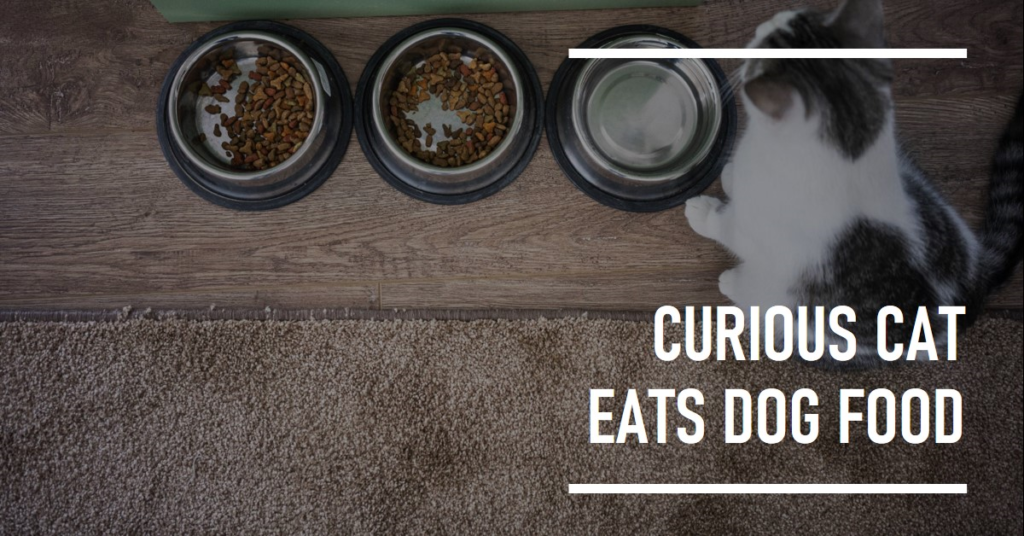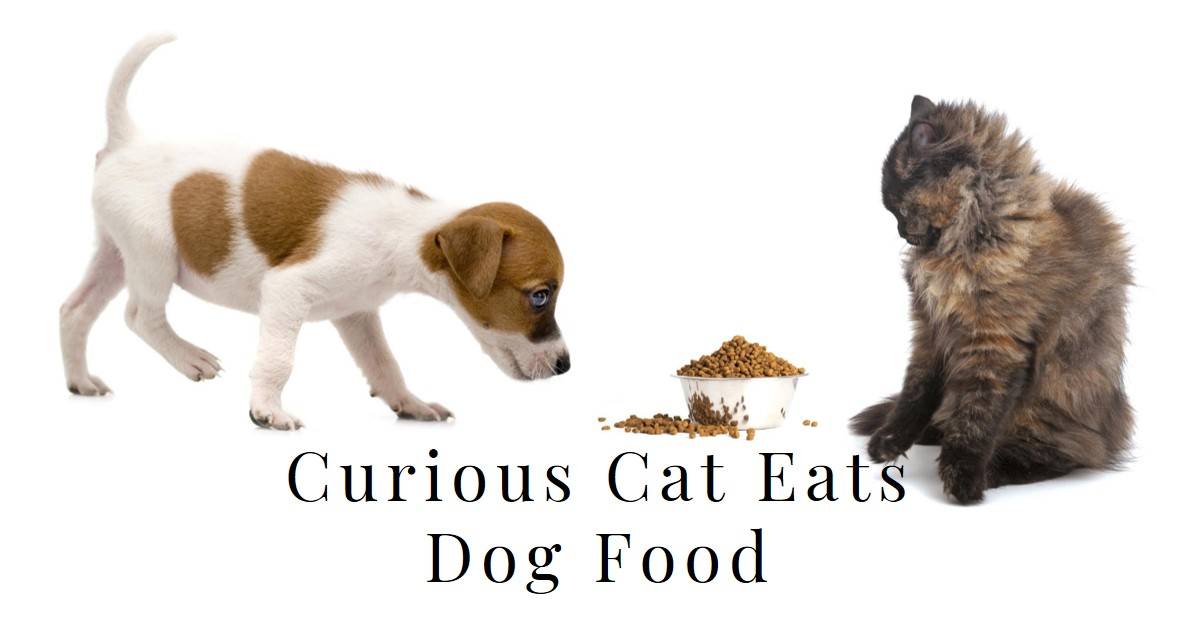As a cat owner, you might be wondering What Happens If My Cat Eats Dog Food? or my feline friend accidentally munched on some dog food. While dog food isn’t toxic to cats, it doesn’t necessarily mean it’s good for them, either. This article will tell you about the potential consequences of a cat eating dog food, helping you understand the risks and how to handle the situation.
Nutritional Deficiencies
Dog food and cat food differ in their nutritional composition. Dog food is higher in protein and fat, which are essential for canine energy levels. However, cats require a higher amount of taurine, an amino acid crucial for heart and eye health, which is often lacking in dog food. Long-term consumption of dog food can lead to taurine deficiency in cats, causing serious health problems.
Digestive Issues
Cats have a shorter digestive tract than dogs, making them less efficient at processing carbohydrates. Dog food contains higher levels of carbohydrates compared to cat food, which can lead to digestive issues like diarrhoea, vomiting, and gas in cats. These digestive problems can cause discomfort and dehydration, requiring veterinary attention in some cases.
Weight Gain and Obesity
Dog food is typically higher in calories than cat food. If your cat regularly consumes dog food, it can lead to weight gain and potential obesity. Obesity in cats is associated with various health problems, including diabetes, arthritis, and respiratory issues.
What to Do If Your Cat Eats Dog Food
If you notice your cat has eaten dog food, don’t panic. Monitor your cat for any signs of digestive upset or changes in behaviour. If they seem normal, there’s likely no cause for concern. However, if your cat exhibits vomiting, diarrhoea, or lethargy, consult your veterinarian immediately.

Potential Health Risks of Dog Food for Cats
While not inherently toxic, dog food can pose several health risks to cats due to its differing nutritional composition compared to cat food. Here are some key concerns:
- Taurine Deficiency: Taurine is an essential amino acid crucial for heart and eye health in cats. Dog food typically contains minimal amounts of taurine, and prolonged consumption can lead to a deficiency. This deficiency can cause serious health problems like dilated cardiomyopathy (heart disease) and vision impairment.
- Other Nutritional Deficiencies: Aside from taurine, dog food may lack other essential nutrients that cats require, such as vitamin A and arachidonic acid. These deficiencies can lead to various health problems, including skin and coat issues, impaired immune function, and reproductive problems.
- Long-Term Health Issues: The long-term effects of a cat regularly consuming dog food can be severe. Chronic taurine deficiency can lead to irreversible heart damage, while ongoing digestive issues can cause malnutrition and weaken the immune system. Additionally, obesity can increase the risk of developing other health problems like diabetes and cancer.
Symptoms of Dog Food Consumption in Cats
Here are some common symptoms of dog food consumption in cats:
- Vomiting
This is a common symptom, especially if the cat has consumed a large amount of dog food. The vomit may contain undigested food or bile.
- Diarrhoea
Loose or watery stools can indicate digestive upset caused by the dog food.
- Gas and bloating
Increased gas and bloating can be uncomfortable for your cat and may be a sign of difficulty digesting the food.
- Changes in Appetite
- Decreased appetite: Some cats may lose their appetite after eating dog food, especially if it upsets their stomach.
- Increased appetite: Other cats may experience an increased appetite as they try to compensate for the lack of essential nutrients in the dog food.
- Weight Changes
- Weight gain: If your cat regularly consumes dog food, it can lead to weight gain and potential obesity.
- Weight loss: In some cases, cats may experience weight loss due to malabsorption of nutrients from the dog food.
- Other Symptoms
- Lethargy: A lack of energy and increased sleeping can indicate that your cat isn’t feeling well.
- Changes in behaviour: Some cats may become more withdrawn or irritable after eating dog food.
- Dehydration: If your cat experiences vomiting or diarrhoea, it can lead to dehydration, which can be serious.
How to Keep your Cat away from Dog’s Food Bowl?
Here are some effective strategies to keep your cat away from the dog’s food bowl:
- Storage
- Airtight containers: Store dog food in airtight containers that your cat cannot easily open. Consider using containers with secure lids or latching mechanisms.
- High shelves or cabinets: Place dog food containers on high shelves or cabinets that are out of your cat’s reach.
- Separate rooms: If possible, feed your dog in a separate room that your cat doesn’t have access to.
- Feeding Practices
- Separate feeding times: Feed your cat and dog at different times to avoid them being around each other during mealtimes. This will minimise the opportunity for your cat to sneak a bite of dog food.
- Supervise feeding: If you cannot feed your pets in separate rooms, supervise them during mealtimes to ensure your cat doesn’t approach the dog’s food bowl.
- Use a slow feeder: Consider using a slow feeder for your dog, which can make it more challenging for your cat to access the food quickly.
- Deterrent Methods
- Citrus peels: Cats generally dislike the smell of citrus fruits. Place orange or lemon peels around the dog’s food bowl to deter your cat from approaching.
- Double-sided tape: Apply double-sided tape around the dog’s food bowl to create an unpleasant sticky surface that your cat will avoid.
- Motion-activated deterrents: Consider using motion-activated devices that emit sounds or sprays to startle your cat away from the dog’s food area.
- Training and Enrichment
- Positive reinforcement: Train your cat to stay away from the dog’s food bowl using positive reinforcement techniques. Reward your cat with treats or praise when they obey your commands.
- Provide enrichment: Ensure your cat has plenty of stimulating toys, scratching posts, and climbing structures to keep them occupied and less likely to be interested in the dog’s food.
Conclusion
While dog food isn’t inherently toxic to cats, it’s not an ideal food source for them. The nutritional differences between dog food and cat food can lead to various health issues in cats, ranging from mild digestive problems to severe taurine deficiency.
If your cat has accidentally eaten dog food, monitor their behaviour and consult your veterinarian if you notice any concerning symptoms. By understanding the potential risks and taking appropriate action, you can ensure your feline friend stays healthy and happy.
Frequently Asked Questions
- Is dog food poisonous to cats?
No, dog food isn’t inherently poisonous to cats, but it can cause health issues due to its differing nutritional content.
- What happens if my cat eats a small amount of dog food?
Occasional small bites are unlikely to cause major problems but monitor your cat for any concerning symptoms.
- What are the symptoms of a cat eating too much dog food?
Vomiting, diarrhoea, weight gain, lethargy, and changes in appetite are common signs.
- What should I do if my cat eats dog food regularly?
Switch them back to a proper cat food diet and consult your vet for advice on managing any potential health risks.
- How can I prevent my cat from eating dog food?
Store dog food securely, feed pets separately, use deterrents, and provide enrichment for your cat.
Also Read:


